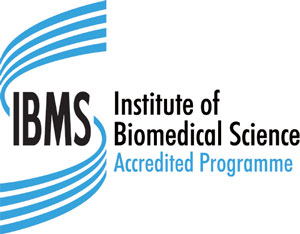| Level of Study | 2020/2021 Fee |
|---|---|
| Full-Time | £9,250* |
| Two-year degrees | £9,250* |
| * These fees are annual and may increase in line with inflation each year subject to the Governments review of Higher Education Funding. | |
| Level of Study | 2020/2021 Fee |
|---|---|
| Undergraduate: | £19,160 |
| Duration | 3 years |
| Placement Year | No |
| Placement Year Fee | N/A |
| Please Note – all fees are on a per annum basis. | |
Biomedical Science is the in-depth study of human biology in both normal and disease states.
This course provides you with detailed understanding of the causes of human disease, how these produce symptoms and the effects of disease on the structure and function of human cells, tissues, and the whole organism. Students learn both current techniques used in the study of human diseases in the NHS, and innovative technologies under development for experimental treatments.
The University of Bradford is in the top 50 universities for research in the latest Research Excellence Framework, with world class researchers undertaking the research-informed teaching.
Recent investment in the Digital Health Zone allows students to access the latest techniques in digital anatomy and pathology, including carrying out digital dissection.
The course is accredited by the Institute of Biomedical Science (IBMS).

The University is committed to helping students develop and enhance employability and this is an integral part of many programmes. Specialist support is available throughout the course from Career and Employability Services including help to find part-time work while studying, placements, vacation work and graduate vacancies. Students are encouraged to access this support at an early stage and to use the extensive resources on the Careers website.
Discussing options with specialist advisers helps to clarify plans through exploring options and refining skills of job-hunting. In most of our programmes there is direct input by Career Development Advisers into the curriculum or through specially arranged workshops.
92% of our 2017 BSc (Hons) Biomedical Science graduates found employment or went on to further study within six months of graduating.*
The average starting salary for our 2017 BSc (Hons) Biomedical Science graduates was £19,875.*
*These DLHE statistics are derived from annually published data by the Higher Education Statistics Agency (HESA), based on those UK domiciled graduates who are available for employment or further study and whose destinations are known.
You will graduate with scientific, experimental and critical skills highly valued in graduate careers. You can apply your specialist skills and knowledge towards research in either medical or industrial research organisations (such as pharmaceutical and biotechnology companies), or universities and research institutes.
Openings exist in medical research (hospitals, universities or research institutes), the pharmaceutical industry, medical information services, teaching, medical writing and publishing. The course also provides essential transferable skills for non-science-based graduate employment.
Many graduates also undertake postgraduate study (medical degrees, Master’s level or PhD level qualifications).
Others seek a more vocational qualification in dietetics or health service management.
Recent graduates have taken up positions as:
For more information, see NHS Careers.
Formal lectures will facilitate your acquisition of knowledge and understanding and discipline specific skills. Laboratory sessions run in conjunction with the theoretical components will give you the opportunity to enhance your understanding of particular topics.
You will be examined, primarily, on the breadth of knowledge via MCQ and short answer examinations. Coursework assignments will give you the opportunity to gain experience in report writing and data handling and interpretation. As you progress through the programme you will have the opportunity to demonstrate increasing skills of analysis, synthesis and criticism through a wide variety of assessment strategies, including written and oral examinations, report writing, case studies, group work, essays, including a dissertation, oral presentations and the project report. The project report provides a major opportunity to demonstrate autonomy in data handling and critical interpretation in a research context.
The majority of modules contain exam and coursework assessment, particularly important for a laboratory based science course. Overall 48% of the course is assessed by coursework. The percentage assessment by coursework increases on progression through the course to reflect development of independent laboratory and study skills.